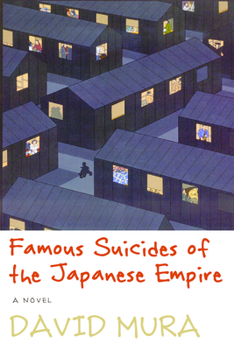Famous Suicides of the Japanese Empire
"There is no writer that dives deeper (or more bravely) into the chasm that is the human heart. [David Mura's] first novel is a tour de force: luminously written and by turns crafty, tough, wise, and... This description may be from another edition of this product.
Format:Paperback
Language:English
ISBN:1566892155
ISBN13:9781566892155
Release Date:September 2008
Publisher:Coffee House Press
Length:280 Pages
Weight:0.85 lbs.
Dimensions:0.9" x 5.4" x 8.2"
Customer Reviews
1 rating
Ghosts of the past
Published by Thriftbooks.com User , 14 years ago
"Sometimes late at night I'll hear them, my dead. My mother, Tommy, my father. Perhaps their voices are part of some acid flashback, remnants of my brief psychotropic college days. Certainly, I don't believe in heaven or an afterlife. Tommy might say they were speaking from another dimension, some alternative universe where the history of our family unfolds in another direction, as a new, unexplored possibility. At any rate, I know they're close by." - from Famous Suicides of the Japanese Empire: A Novel by David Mura I wonder if I'm particularly insensitive, or just life-focused, but I find myself largely inured to death. Having had it strike close to me a few times, it loses much of its power to frighten me. That's not to say I don't feel sorrow when a loved one dies. I do, but I've grown so tired of being frightened of it, so resigned and even jaded to its inevitability, I look at it as a long period of rest after the wretched mess that is life. The fact remains, butting our heads against the wall, hoping to receive some sign from beyond, is futile. This I've learned, too. I don't visit cemeteries, as a general rule. Not those containing the remains of anyone I've known, though I do enjoy wandering through old cemeteries, taking photos and stopping to wonder about the people whose names are on the stones. When I see a string of infants from the same family, dying within a couple years or less of each other, I think of the heartbreak that family knew, wondering if each new pregnancy was celebrated after experiencing so much loss. Or, maybe their hearts had turned to stone, of necessity. So they couldn't be broken again. I was 25 when I lost my oldest brother. He was eleven years older, meaning we'd had much less in common than if we'd been closer in age. Though I'd had legitimate issues with him, reasons I could have justified feeling less of a loss, it hit me very hard. It just wasn't supposed to be that way. There was no happy ending. In a way, he was responsible for his own death. In another way, my parents were. I don't mean directly. He wasn't murdered; it was more like a slow suicide, committed over the course of 36 years. Like a lightning storm, you could see it coming, but were powerless to prevent it. The only choice was to weather it. In many ways, David Mura's book reflects my own experience losing my brother. His "people," the family who left him, were each in some way fractured, but the loss of them still couldn't be neatly packaged and put away on a shelf, like a treasured memento. Having legitimate reasons for feeling resentment against someone can't prepare you for their loss. Once the end is signalled there is no more, ending any potential opportunity to repair broken bridges, or to have that familiar grudge to lean on, as an excuse for your own failures. And, when death happens within a family, especially if it leaves just one person behind, it's like an echo reverberating in an empty room. There may be others in y





